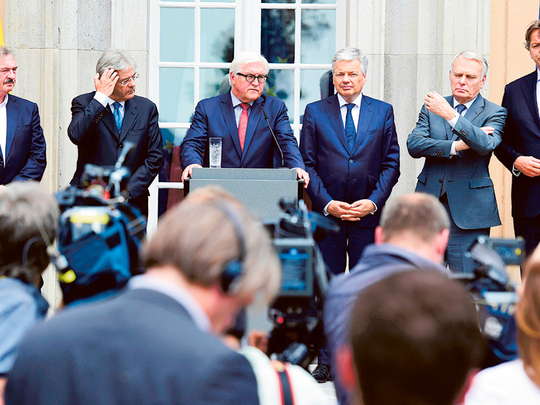
London: European officials in Brussels and leaders in a range of capitals across the continent are piling pressure on British officials to begin their divorce proceedings sooner rather than later.
And they say that as a majority of Britons voted to Leave, the London government can’t stall the talks until after October just to suit Prime Minister’s David Cameron’s domestic political agenda.
No country has ever voted to leave the 28-member bloc, and the formal process begins when London services notice to the European Commission — the cabinet-style council that runs the European administration. The Treaty of Lisbon does allow for countries to leave, by invoking Article 50, setting a timetable in motion that allows for two years’ of talks.
Having gambled his political future on a majority backing ‘Remain’, Cameron was left with little choice but to announce his resignation on Friday morning.
But instead of going immediately, Cameron said he wanted to steady the ship, but it needed another captain to being the extraction talks with the EU. He says he will leave office sometime in the next three months, giving time for the Conservative party to select a leader before its annual convention in October. And that new party leader — and prime minister — should then formally notify Brussels of the UK’s intention to leave be invoking Article 50.
But the result of the referendum is clear cut — with 52 per cent of those who voted deciding to Leave, and 48 per cent for Remain.
“Britons decided to leave the European Union so it doesn’t make any sense to wait until October to try to negotiate the terms of their departure,” European Commission President Jean-Claude Juncker said.
His call was echoed by Francois Villeroy de Galhau, a Governing Council member of the European Central Bank ECB). That financial institution is in close contact with the Bank of England to ensure that there’s enough support to prevent a run on banks, the pound or the euro.
The fear is that the longer the UK takes to act, the greater uncertainty will undermine confidence in Europe and its economy.
But it’s not just about money.
With far-right and Eurosceptic parties in France, Austria, the Netherlands and Poland all looking at the British result, they are now emboldened to seek similar In or Out referendums in their own countries — spelling a potential end for the European integration movement of the past five decades.
France’s foreign minister said he wants the EU to move quickly on coming to divorce terms with the United Kingdom.
“Negotiations have to go quickly in the common interest,” Jean Marc Ayrault said on his way to a meeting of foreign ministers from the six founding members of the EU: Germany, France, Italy, the Netherlands, Luxembourg and Belgium.
But Germany seems to be adapting a more pragmatic, go slowly approach — more in line with Cameron’s thinking.
“It is completely clear that we now have a situation that allows for neither hysteria nor paralysis,” Frank-Walter Steinmeier said. “We must not resort to hectic activity, and act as if all the answers are ready.”
Simply put, no one has answers, and the result of Thursday’s referendum has placed the entire EU bloc in an unprecedented position.
Foreign ministers of the six original EU members — Germany, France, Italy, the Netherlands, Belgium and Luxembourg — gathered in Berlin for the first in a series of emergency meetings over the next week triggered by Britain’s decision.
“We join together in saying that this process must begin as soon as possible so we don’t end up in an extended limbo period but rather can focus on the future of Europe and the work toward it,” said German Foreign Minister Frank-Walter Steinmeier as he entered the meeting at a lakeside villa.
The Franco-German axis at the heart of the bloc, which was born out of a determination to forge lasting peace after two world wars, will propose “concrete solutions” to make the EU more effective, French Foreign Minister Jean-Marc Ayrault said.
He, too, called on London to move more swiftly.
EU leaders will open a two-day Brussels summit on the crisis on Tuesday.
In an early sign of the Brexit fallout in Brussels, Britain’s European commissioner for financial services, Jonathan Hill, said he would stand down.
“I don’t believe it is right that I should carry on as the British commissioner as though nothing had happened,” he said in a statement.
Britain faced a historic break-up threat, too, as Scotland stood aghast at the prospect of being dragged out of the 28-nation European Union when more than 60 per cent of its people voted to stay in.
“A second independence referendum is clearly an option that requires to be on the table,” First Minister Nicola Sturgeon declared after an emergency meeting of Scotland’s parliament, which agreed to start to draw up legislation that could enable such a vote once a decision is taken.
— With inputs from AFP












